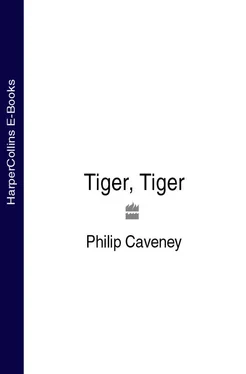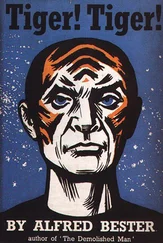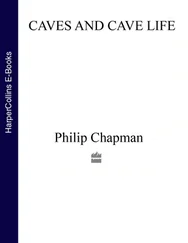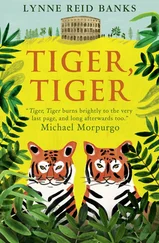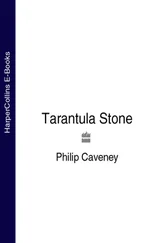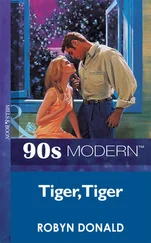He paused for a moment to listen. Far away to his right, deep in jungle sanctuary, the lonely sound of an argus pheasant calling to his mate. Silence for a moment and then a barking deer sounded an alarm as the wind carried a familiar odour to his nostrils. Haji growled softly to himself and was about to move on when a new sound came to his sensitive ears. He froze in his tracks, snapped his gaze to the roadside at his left. The sound was not made by any kind of animal that he knew of. It was a rapid whirring noise, much too loud to be produced by the wings of any insect. Haji slunk beneath the cover of some large ferns as a light came soaring out of the darkness. He twisted around, holding himself ready to run if need be. For an instant, the twin orbs of his eyes mirrored the bouncing reflection of the light.
A curious vehicle sped into view, a gleaming, clattering, froglike thing in which two Uprights were riding. Haji could see them quite clearly for an instant in the glow of the light, which swung from side to side in front of their heads, like a dangerous firefly. Haji could see the naked wrinkled sternness of their faces, as they gazed unswervingly at the road ahead of them. How foolish to travel in such an unthinking manner, always looking forward when danger might lie in the shadows at either side of them; or was it simply that the Uprights were so powerful, they did not fear the beasts of the jungle? They did not look very powerful, that was for sure.
The Uprights left a curious smell behind them on the wind, a fragrant burning-leaf smell that lingered on the warm air for some moments. Haji sniffed, grimaced, watched as the Uprights sped away into blackness, taking their light with them. For some time, he was still aware of the constant whirring noise, fading gradually into distance. Then his thoughts returned to the sound of the barking deer he had heard before the interruption. He emerged from the bushes and moved right of his original path, heading deeper into jungle, his head down, his mind intent on the long hunt ahead of him.
The barking deer sounded again and Haji homed in on the noise, moving with the calm, silent intent of one who had been hungry for far too long.
The trishaw driver came to a halt outside Harry’s bungalow, part of a small estate just off the coast road, a mile south of the nearest village, Kampong Panjang, which they had passed on the two-mile journey from Kuala Hitam barracks. Harry alighted and pressed a dollar into the driver’s arthritic hand. The fare was always the same, whatever the distance, and the old man would probably have been insulted if Harry tried to give him more than that.
‘Safe journey back,’ he told the Chinaman.
‘Of course, Tuan!’ The old man grinned, waved briefly, and pedalled gamely away, hoping to reach his own home safely. Few trishaw owners ventured to drive at night, preferring to leave it to the taxicab drivers, but this engaging fellow had somehow discovered Harry’s regular Mess nights and would not have dreamed of missing a single one of them. Neither, for that matter, would Harry have dreamed of using another driver.
‘You get to a certain age,’ thought Harry, ‘and all your life becomes a ritual. Has to. The only way you can make any bloody sense of it.’
He unlatched the metal gate and strolled into the large, neatly ordered garden. The path was wide enough to take a car but curiously, in all his years in the army, he had never learned to drive. There had always been somebody to ferry him about and that was the way he preferred to keep things now. He strolled up the path, past banana and papaya trees, whistling tunelessly to himself. The bungalow was like many others, purposely built for British tenants. A long, low, white-painted building with a green slate roof and an adjoining verandah; it was compact, practical and possessed no particular style. The windows were comprised of slatted bars of frosted glass that could be levered open, like venetian blinds, to admit fresh air. These were reinforced by metal bars that had been disguised as wrought-iron decorations in an attempt to make them look more attractive. In fact, they looked quite hideous. Harry, who believed in calling a spade a spade, would have preferred plain upright bars. A more acceptable feature were the sliding metal grills that could be padlocked across the front and back doors of the house. A legacy of more Communist-threatened times, they were still very useful weapons in the constant war against house-thieves that had been going on for many years and showed no signs of letting up yet.
No sooner had Harry inserted his key in the front door and stepped into the house, than Pawn, Harry’s aged amah , came bustling up to greet him. There was a toothy smile of welcome on her wizened little monkey-face and she still held a straw broom with which she had presumably been dusting somewhere. Pawn never stopped work while she was in the house and when there was no work, she quite simply invented some. She lived at Kampong Panjang and usually went home to her own family at five o’clock. But on the nights that Harry went to the Mess, she insisted on staying the night in the amah ’s room at the back of the house, to ensure that the ‘Tuan’ was properly looked after when he came in. Harry would quite happily have looked after himself, but once Pawn had an idea fixed firmly in her mind, it was impossible to shake it.
‘Tuan have good time soldiers’ Mess?’ she inquired; and before waiting for a reply, she was hurrying off to the kitchen to prepare the cocoa and biscuits that Harry always had before retiring for the night.
He shook his head ruefully, wondering just exactly how it was that he had managed to get himself saddled with a cranky old creature like Pawn. Most of his acquaintances had pretty young Chinese amahs to care for their needs. It was easy enough to organize: there were countless agencies in Kuala Trengganu that specialized in providing the girls. You simply had to tell them what your preferences were and if the girl turned out to be lazy or inefficient, you simply sent her away and ordered another one. But Pawn now, she’d been a legacy of sorts. She’d worked for the previous occupant of the house, a mining engineer, and the day Harry had moved in she’d just arrived on his doorstep, walked past him into the house, and commenced work. Mind you, it was not as if Harry had any cause for complaint. She was an excellent worker, worth every cent of the one hundred and twenty dollars a month wage she received. This worked out at about fifteen pounds and was considered a decent wage by Malay standards. She was far too proud to accept anything more than her basic salary, but Harry had found that she was not averse to accepting little gifts from time to time, particularly if they were intended for her grandson, Ché, of whom she was very proud. The boy was a bright, articulate twelve-year-old, who sometimes accompanied his grandmother to the ‘Tuan’s’ house and had, as a result, become a great friend of Harry’s. In fact, if the truth were known, Harry doted on the boy, reserving for him the kind of affection that he would have given to his own son, if he had ever sired one.
A photograph of his late wife, Meg, stood on the sideboard. Harry walked over to it now, as he often did, picked it up, and stared thoughtfully at the face he had loved for so many years. She had always been a rather frail sort of creature and it was a wonder that she had ever taken to a life in the tropics as well as she had. She had died quite suddenly, in 1950, a cerebral haemorrhage. They had tried for children most of their married life, but something was evidently wrong with one of them. Ironically enough, the night before Meg had died, the two of them had discussed the possibility of adopting a Malaysian child. They had both been strongly in favour of the idea. Later, that same evening, Meg had awoken from sleep complaining of a terrible headache. She got up to go to the bathroom and fetch some aspirins, but halfway to the door, she had spun around to look at Harry, her face suddenly drained of colour and she had spoken his name once, softly, in a tiny, frightened tone. In that instant, he had somehow known that it was all over for her, that he would never hear her voice again. She had crumpled lifelessly to the floor before Harry could reach her and there was not a thing in the world he could have done to save her. Then, his grief and torment had been indescribable; but now, looking back with the advantage of hindsight, he knew that when his time came, this is how he would want it to be. Quick, clean, a minimum of fuss and pain; far better than lingering on in some hospital ward, a useless, incontinent old fossil. His own father had died that way, during the war. Harry had only been allowed leave to visit him once and he vividly remembered leaving the hospital room for the silence of the corridor outside, where he had proceeded to cry like a baby for several minutes, unable to stop himself. It was not the grief of losing his father that had affected him so; it was more a horror at the appalling loss of dignity the old man was suffering. He had been incapable of doing anything for himself by this time. In Harry’s opinion, all a man had was his dignity. Lose that and you had lost the reason for living. But his father had lived on, a horrifying eighteen months longer in that tiny cheerless hospital room. It was Harry’s personal nightmare to find himself with a similar prospect at the end of his life.
Читать дальше
